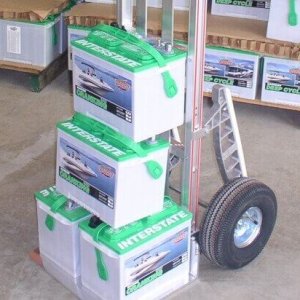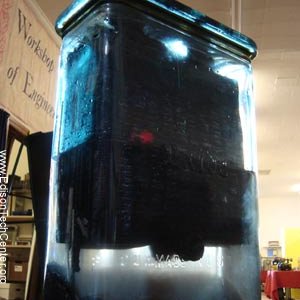The Truth about storing batteries on concrete
We often get asked about whether its ok to store a battery on concrete, there seems to be the persistent myth that a battery needs to be stored on something made of wood etc, however this is not the case.
An article written by Jonathan Jarry (M.Sc.) which was first published by McGill University in 2017(YES! 2017!) debunks this myth and explains its origins and why we have come to believe this.
If you would like to read the original article you can Visit the original article here

Fact or fiction?
This myth was once true! When batteries were made out of wood casing with glass cells, storing a battery on concrete increased the risk of the battery casing becoming wet, and therefore swelling the casing. This would cause the glass cells to shatter!

Battery made of glass??
Later on, batteries were sometimes not wrapped in a casing at all allowing electrical discharge into the concrete.
Over time battery casing has been imroved(though it took some experiments).
Todays batteries are housed in heavy duty plastic or hard rubber which reduces the electrical discharge between a battery and its environment. Batteries will still discharge over time- but this is normal!
So how do i make my battery last longer?
Inspect your battery for signs of damage, wear and tear or abnormalities often. Batteries do not like extreme temperatures so if you have a battery under bonnet, ensure that it is designed with the correct heat shielding.
Ensure that your charging system is at the correct voltage for the battery to avoid over/under charging, and if you have any concerns, pop in to our battery store and we can test and inspect your battery!
common battery myths
While both cranking (starting) batteries and deep cycle batteries store and release energy, they are designed for different purposes. Cranking batteries are optimised to deliver short bursts of high current needed to start an engine, while deep cycle batteries are designed to provide a steady amount of power over a longer period. Using a cranking battery in a deep cycle application or vice versa can lead to poor performance and reduced battery life
While deep cycle batteries are not designed for the rapid, high-current discharge needed to start engines, some modern deep cycle batteries are engineered with dual-purpose capabilities. These batteries are designed to provide a reasonable amount of cranking power while still offering the benefits of deep cycling. However, they may not perform as well as dedicated cranking batteries in starting applications
Cranking batteries are not built to withstand deep discharges (discharging to a low state of charge), which can lead to a significant reduction in their lifespan and capacity. It’s best to keep cranking batteries charged above 50% whenever possible to ensure their longevity and optimal performance in starting applications.
While deep cycle batteries are more resilient to deep discharges than cranking batteries, they still require proper maintenance. Regular charging, avoiding deep discharges, and periodic equalization (if applicable) are essential to extend the life of deep cycle batteries. Neglecting maintenance can lead to sulfation and reduced battery capacity.
Sealed deep cycle batteries, often referred to as maintenance-free batteries, are designed with minimal water loss. Unlike traditional flooded batteries that require periodic water replenishment, sealed batteries should not be opened for adding water. Attempting to do so can damage the battery and void its warranty.
When using multiple batteries in a bank (e.g., for an off-grid solar setup), it’s essential to use batteries of the same type, age, and capacity. Mixing different types (e.g., cranking and deep cycle) or different ages can lead to imbalanced charging and discharging, reducing overall system efficiency and battery life.
